Inside the Flatbush Churro Wars

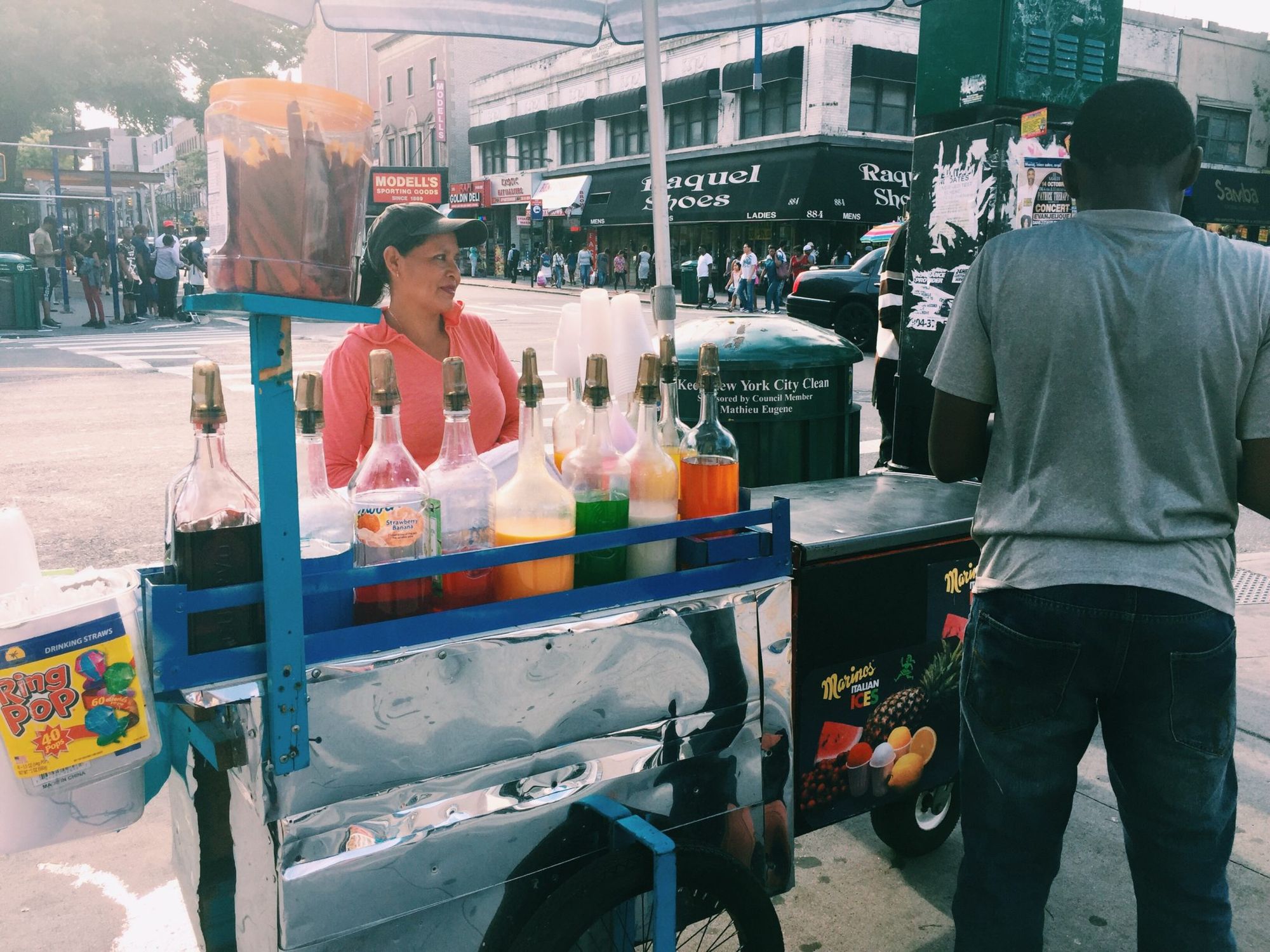
FLATBUSH – Churros. Hot dogs. Ices.
Flatbush is a home to all of the above. You won’t necessarily find them in brick and mortar stores. Instead, you would walk up to a beat up cart and order one from there.
There are about 20,000 street vendors selling things from hot dogs to t-shirts in NYC right now, Street Vendor Project (SVP) says. Two months ago, street vendors in Flatbush organized and spoke out against economic and racial harassment:
What triggered the protest in June, Activist Imani Henry from Equality For Flatbush (EFF) at the time said, was that two leaders of EFF were issued tickets ($2,000 each, they claimed) by the NYPD as they were vending in front of the Chase bank near Church Ave and Flatbush Ave, on Friday, June 9. “The tickets are clearly marked from the Department of Health but was issued by an NYPD officer from the 70th Precinct,” and street vendors were claiming they were being harassed by the police.
We spoke to vendors who say they do feel unfair pressure from the police, but city ticket numbers suggest the opposite: Tickets are actually down sharply in 2017.
The Vendors
To begin, we spoke to 44-year-old Enma Tenezaca.

Tenezaca immigrated to the US from Ecuador in 2002, and has been street vending ever since. She sells Italian ices everyday from 1 to 6pm; the money goes to her family and to reinvest.
In her family, she is the only one who works. She is “the mom and the dad,” as she puts it. In 2004, she got a license to sell on the street. But, a license is useless, if a permit isn’t along with it, as a permit is what’s needed to use a cart.
Your License Is Not Worth Much Without A Permit
Unfortunately for vendors like Tenezaca, permits have been capped at 5,100 since the late 1980s, confirmed the DOHMH.
This number includes temporary/seasonal citywide (1,000), full-term citywide (2,800), borough specific (200), full-term disabled veteran/disabled person/veteran (100), and green cart permits (1,000). There are also two permits that are not subjected to a legal cap, and that includes the specialized vendor permit (for the disabled veterans), and the restricted area permit.
According to the NYC.gov, “New permits are available only to those licensed vendors who were placed on the Food Cart Waiting List and notified by the Department of Health to apply for the permit.”
Any change to the capped number is subject to legislation by the NYC Council, which has been working to potentially double the number of permits over the next seven years
The Black Market
In the meantime, for many vendors wanting to operate legally, the only option to obtain a street vending permit is the black market. In February 2016, we reported that Sunset Park food truck vendors testified to Community Board 7, that they had to resort to the black market to get vending permits because the city made it too difficult.
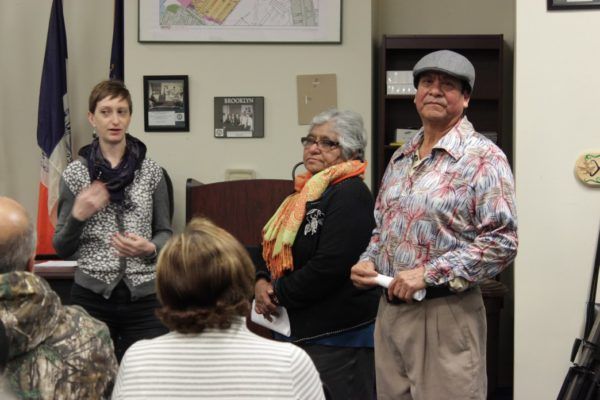
Two-year, full-time permits that the city issues for $200 can cost up to $25,000 in the black market, the New York Times reported back in October of last year.
Carts
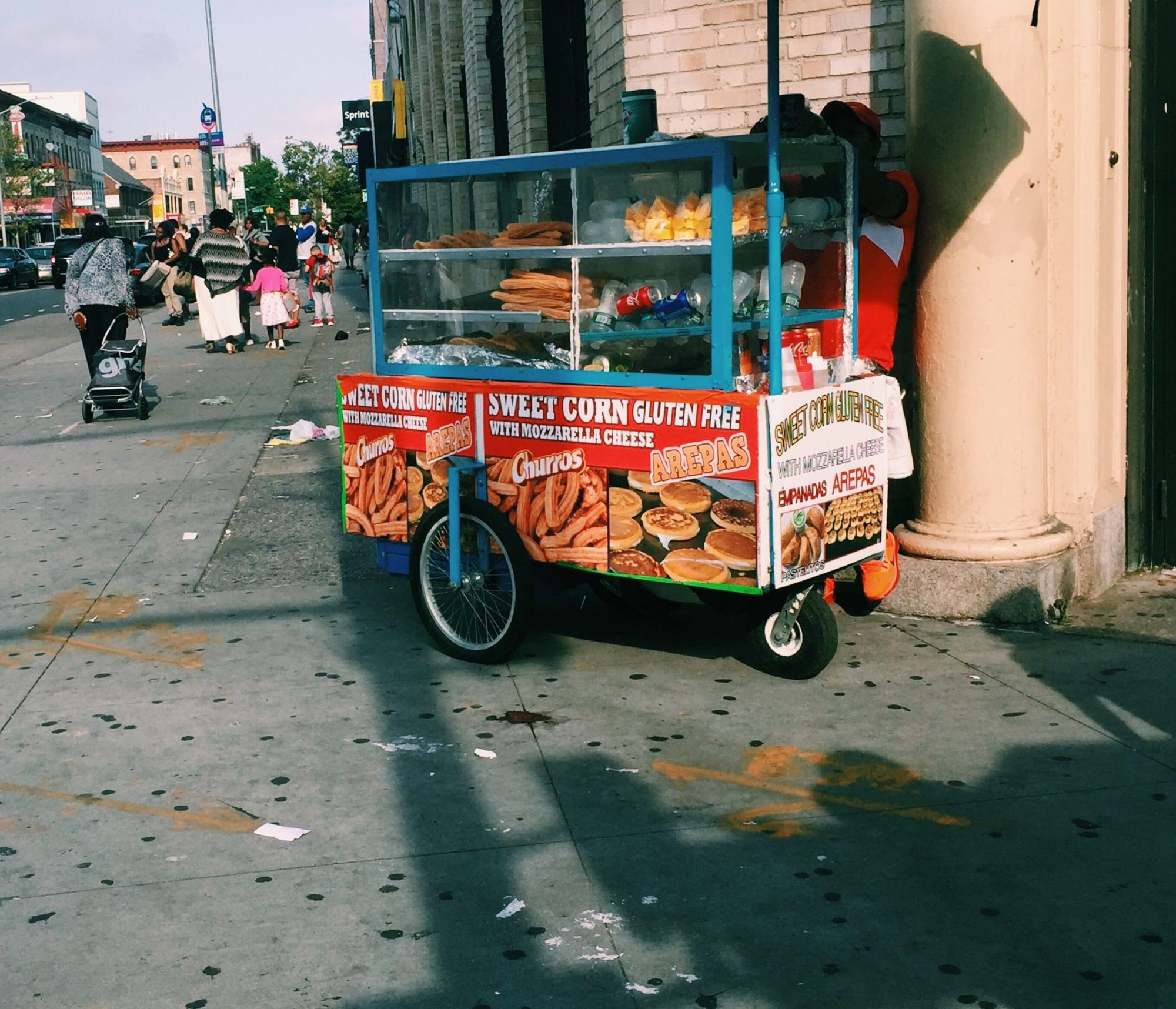
Street food vendors rely on carts. Tenezaca got her cart for free from a lady who nicely gave it to her for work. Luckily for her, her cart has never been taken away for vending without a permit. But if it were, it would cost a whole lot to buy another one.
“There are some that cost four to five thousand dollars, if they’re special ones,” she said. “If they have different features, they can be more expensive. When the city takes those away we have to figure out how to get the money together to get them back because that can cost money.”
Carts have to be inspected to get a permit. “We cannot guarantee that the vendor has the appropriate food safety training necessary when serving food to the public,” a DOHMH spokesperson said. But for those thousands of people, including Tenezaca, who vend without permits, their carts were never inspected.
Rules & Enforcement
Tenezaca, like Henry, claims that the police have been harassing the street vendors in Flatbush. “It’s not fair,” she said. “We’re hardworking people who need to support our families.”
“We’re not hurting anybody,” she said.
But they are breaking rules.
Current rules restrict street vendors from selling on Flatbush Avenue from Parkside to Avenue I, Monday to Saturday from 8am to 9pm, leaving only Sunday open. If you sell on the stretch on any day other than Sunday, even if you have a valid license & permit, you are breaking rules.
Back in 2002, the Flatbush Business Improvement District (BID) claimed unfair competition when street vendors were selling near brick and mortar stores.
The City Limits article quoted then Flatbush BID President Jack Katz saying, “Why should somebody be allowed to peddle on the street when my merchants can’t even put out their own stuff? They were breaking the law being in the street. It was not kosher.”
“Just because street vendors aren’t brick and mortars doesn’t mean they aren’t small businesses,” Henry said. “They are people who work hard, do everything right, and get fined for it. That’s a slap in the face.”
Are Street Vendors Bad For Brick-And-Mortar Stores?
In a 2015 Economist Roundtable study, researchers examined three locations in Los Angeles and found that retail stores were more likely to see growth when street vendors set up nearby, representing a synergistic relationship between street entrepreneurs and brick and mortars. (This was especially true when they sold products that were different from neighboring retailers.)
Current Flatbush BID President Lauren Elvers Collins was not available for comment.
“The thing is we pay taxes to the City just like everybody else,” Tenezaca said. “We record what we sell, we pay every three months, and we also pay the City. And so we’re also small businesses.”
According to Henry, many street vendors don’t sell things that brick and mortars sell. A prime example? Churros.
“Out of the many people I’ve asked, the average person buys churros from near a subway station,” Henry laughed. “And you know who’s near subway stations? Street vendors.”
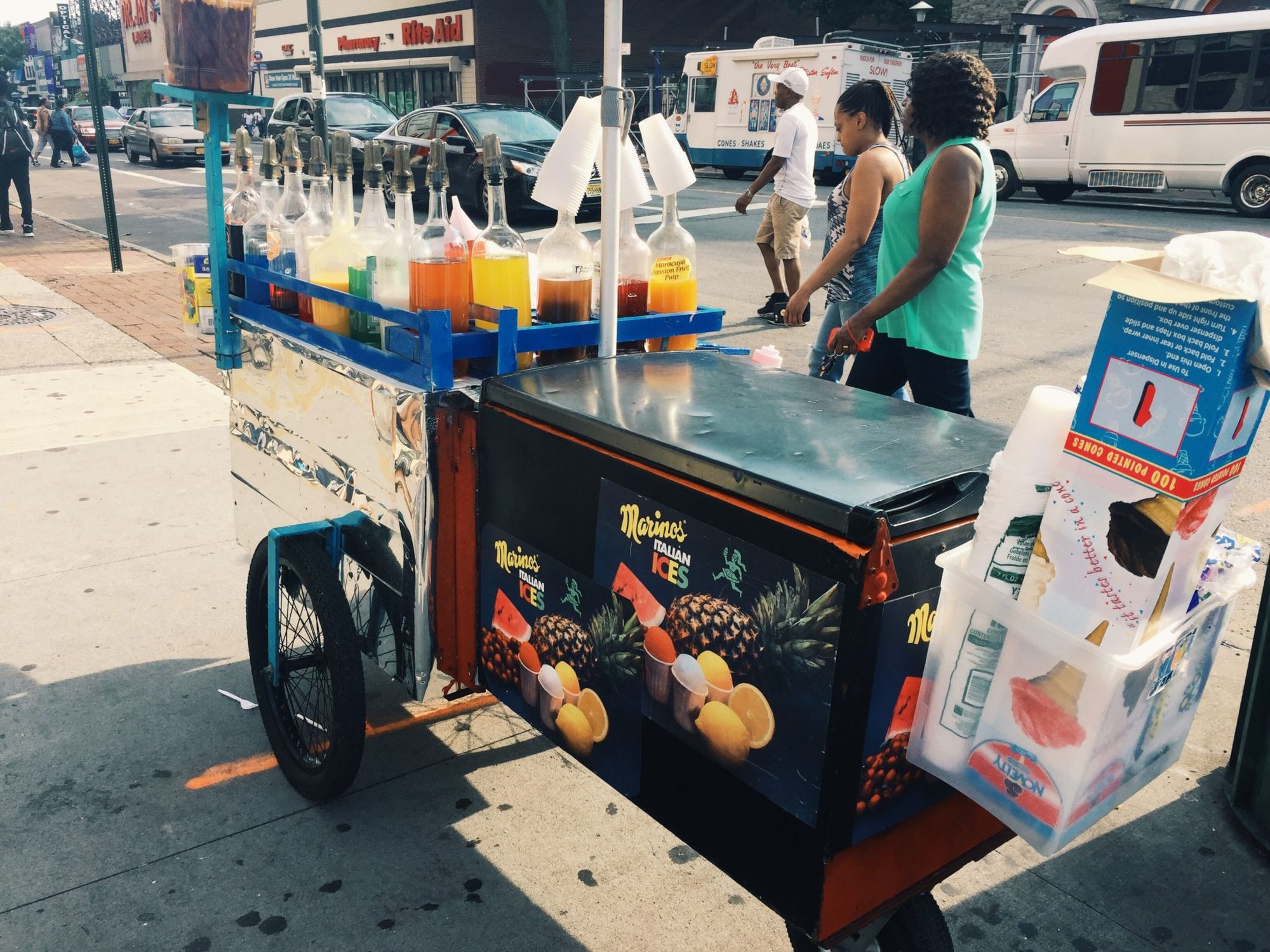
Ticketing & Police Harassment – The Numbers Are Not There
Equality For Flatbush is fed up with the amount of tickets being issued, and alleges police harassment of street vendors.
Harassment comes in all different forms, and is more than just a ticket. We decided to only investigate ticketed harassment because that is what we can quantify.
We analyzed data for food vendor tickets issued in Flatbush (zip codes: 11203, 11210, & 11226) from January 2015 to August 2017, using data available through NYC Open Data. Tickets varied from not having a permit, to vending unapproved items, to having the car touching or leaning against a building.
It turns out, the amount of tickets received in 2017 has actually decreased significantly. While there were about 70 tickets issued both in 2015 and 2016, and just 27 issued so far in 2017, comparing January-August across the years there is a significant drop in number of tickets issued: from 41 in 2015, 44 in 2016, to just 27 in 2017.
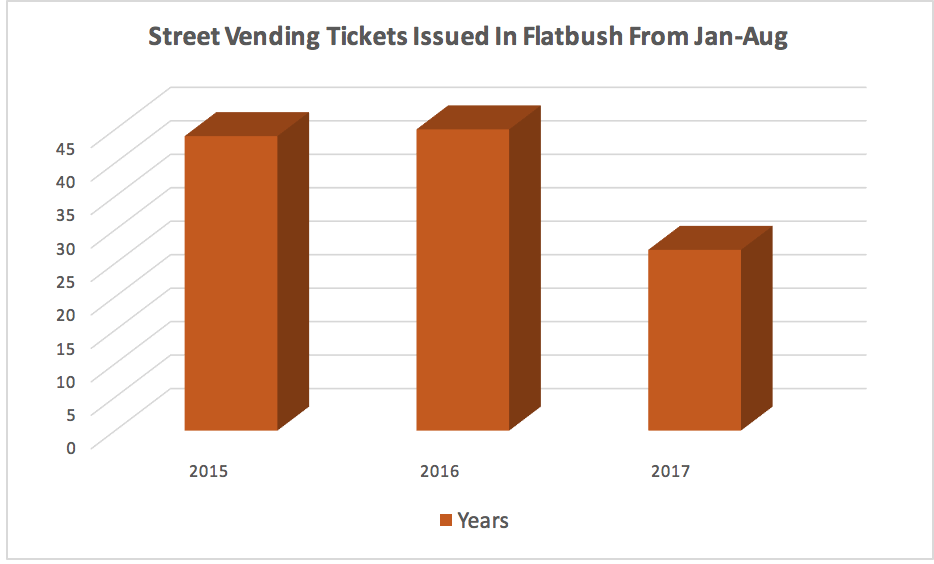
It is possible to get a $2000 ticket. “There is a $1,000 fine for operating without a permit AND for operating without a license. Thus, when a vendor is in violation of both, a summons is issued with a penalty of $2,000.” Despite what Tenezaca (and Equality For Flatbush) said, she was issued a $1,000 ticket, not a $2,000 one.
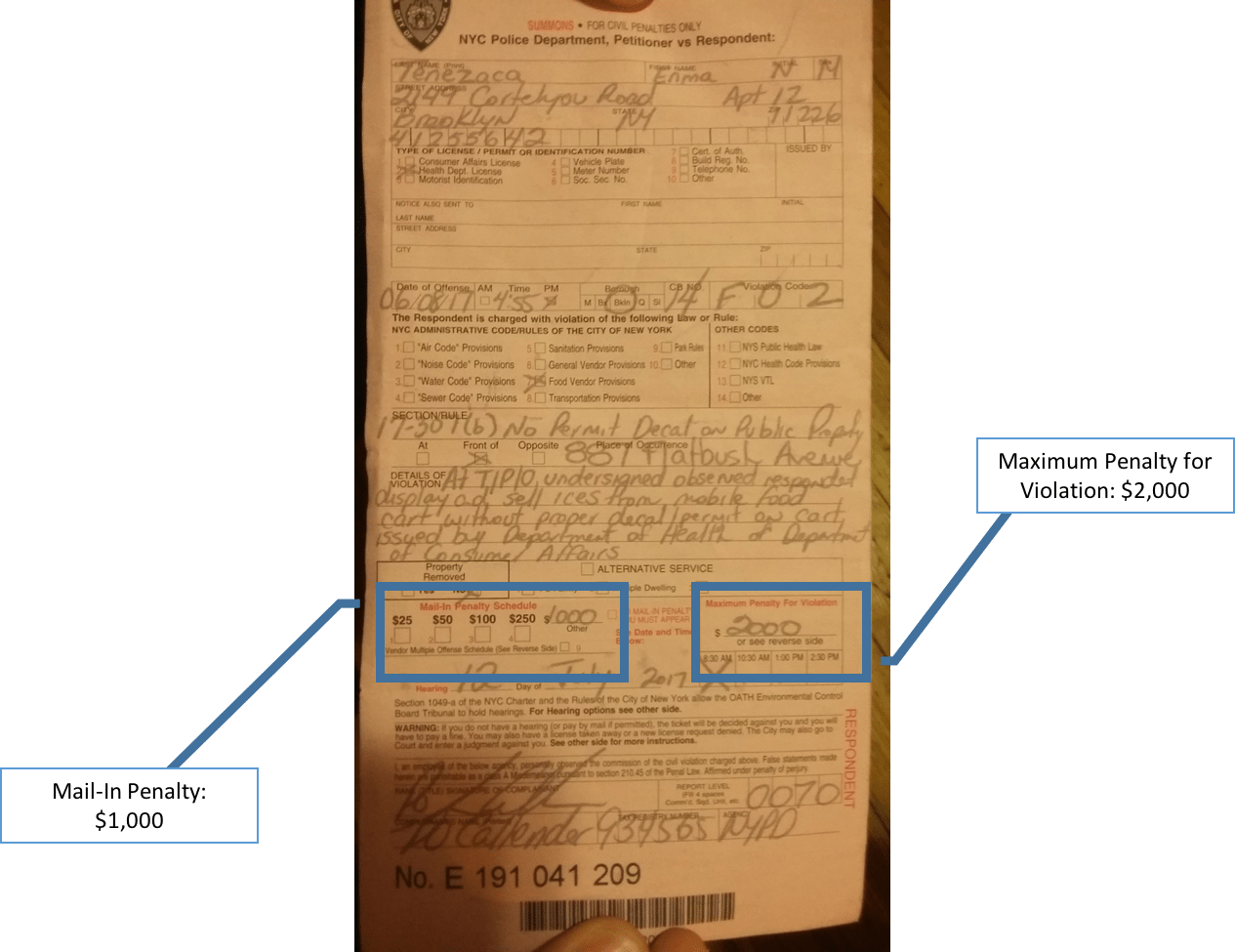
A mail-in penalty is what needs to be paid. If the summons is not responded to, the maximum penalty is the amount the respondent could face.
Tenezaca did have a license but not a permit. Thus, she received a $1,000 ticket, which was dismissed at her hearing on July 12, based on information available through NYC Open Data.
Though Tenezaca herself was not issued $2k tickets, there are street vendors in Flatbush who have. According to the data we analyzed, four vendors were issued two $1,000 tickets each (a total of $2k) in 2017. From January to August in 2016, 11 vendors were issued $2k tickets, and in 2015, 5 vendors were issued the tickets.
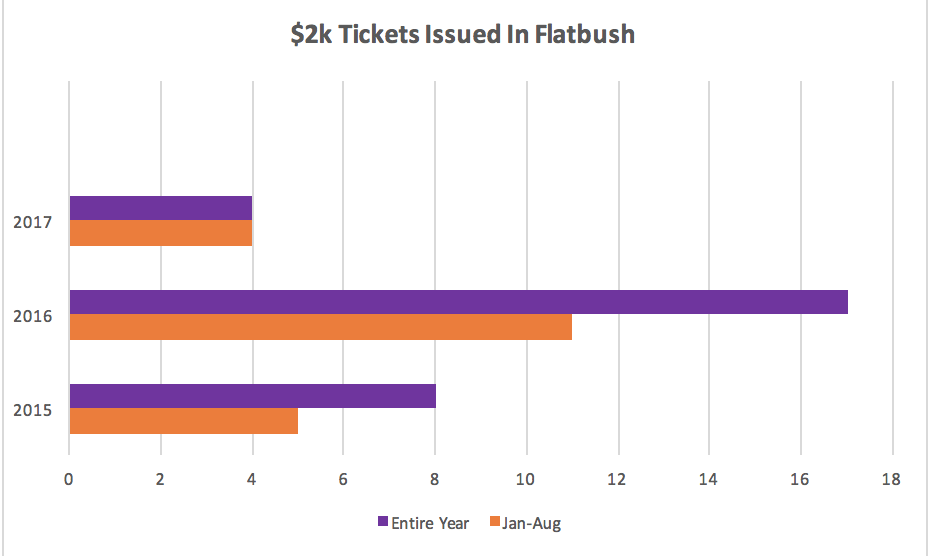
The data in these charts was fact-checked by the DOHMH prior to publishing this story. However, we will note that some data did not show in the data set we filtered, but did show individually, and this may be due to a tagging error of some sort in the Open Data site.
In 2013, we reported on the City Council passing a handful of new legislation aimed at making business easier for mobile vendors, including creating a $500 cap on the amount of fines a vendor can receive during inspections. Previous regulations capped it at $1,000.
Some City leaders, like Bay Ridge Councilman Vincent Gentile, argued against the passed legislation:
“I hear what [business owners are] going through with city agencies trying to wring them dry with fines and they are not happy,” Gentile said in a press release at the time. “Why aren’t we lowering fines for the brick and mortar business owner who is already paying a premium to rent a storefront on a main commercial strip while covering business and property taxes, water bills and private sanitation?!”
Will There Be More Permits?
In 2016, City Council proposed a legislation called the Street Vending Modernization Act to curb the sale of black market vending permits and reform the vending regulations.
Among the many City Council members that helped introduce it was New York City Council Speaker Melissa Mark-Viverito:
“Street vendors add vitality to our streets and are an untapped economic resource. Street vending serves as an entry point into the City’s economy for low income New Yorkers and has created thousands of jobs, while serving millions of meals from every cuisine imaginable. Yet this vital economic asset has long been ignored and even stifled. The number of food vendor permits has been capped since the 80’s,” she said. “Street vendors have been targeted with inconsistent enforcement and shaken down by unscrupulous permit holders who currently control access to the limited pool of vending permits. This legislation will increase opportunities for vendors and reduce the barriers to entry for street vendor entrepreneurs by raising the number of food vending permits while also implementing enforcement mechanisms to ensure that the rules are followed and our public spaces remain safe and vibrant.”
If passed, the Act could “double the number of food vendor permits over seven years with five percent of new permits being set aside for veterans and the disabled,” according to a statement by the NYC Council.
Testimonies
On October 26 last year, the CUNY Urban Food Policy Institute testified on the Act. In their testimony they said, that if the Act was implemented, it can help contribute to three health goals:
1. Increasing access to healthy affordable food in New York City
2. Improving pay and working conditions for street vendors and opening new paths to employment for under- employed and unemployed populations
3. Reducing food safety and environmental risk posed by food carts.
The CUNY Urban Food Policy Institute claimed in their testimony that if the “number of venders [increases] by 600 a year for the next seven years, New York City can use market forces to encourage more vendors to meet the unmet demand for healthy affordable food.”
But the bill, which would start in March 2018, is facing pushback from the Real Estate Board of New York (REBNY). The Board believes that allowing more vendors would hurt local brick and mortar stores.
REBNY also testified on October 26. “REBNY understands the desire to curtail the black market in permits and provide affordable business opportunities for a broad portion of the population. However, at each phase of granting additional vending permits, a periodic and meaningful review of the current issued licenses should be pursued. Furthermore, this bill might run counter to current sustainability efforts, ” its senior vice president, John Doyle, said at the testimony.
Doyle continued by adding that more vendors will increase air pollution and traffic congestion. “The increased number of food trucks necessitates a provision for these vendors to comply with rigorous standards that reduce both pollution and noise levels.”




